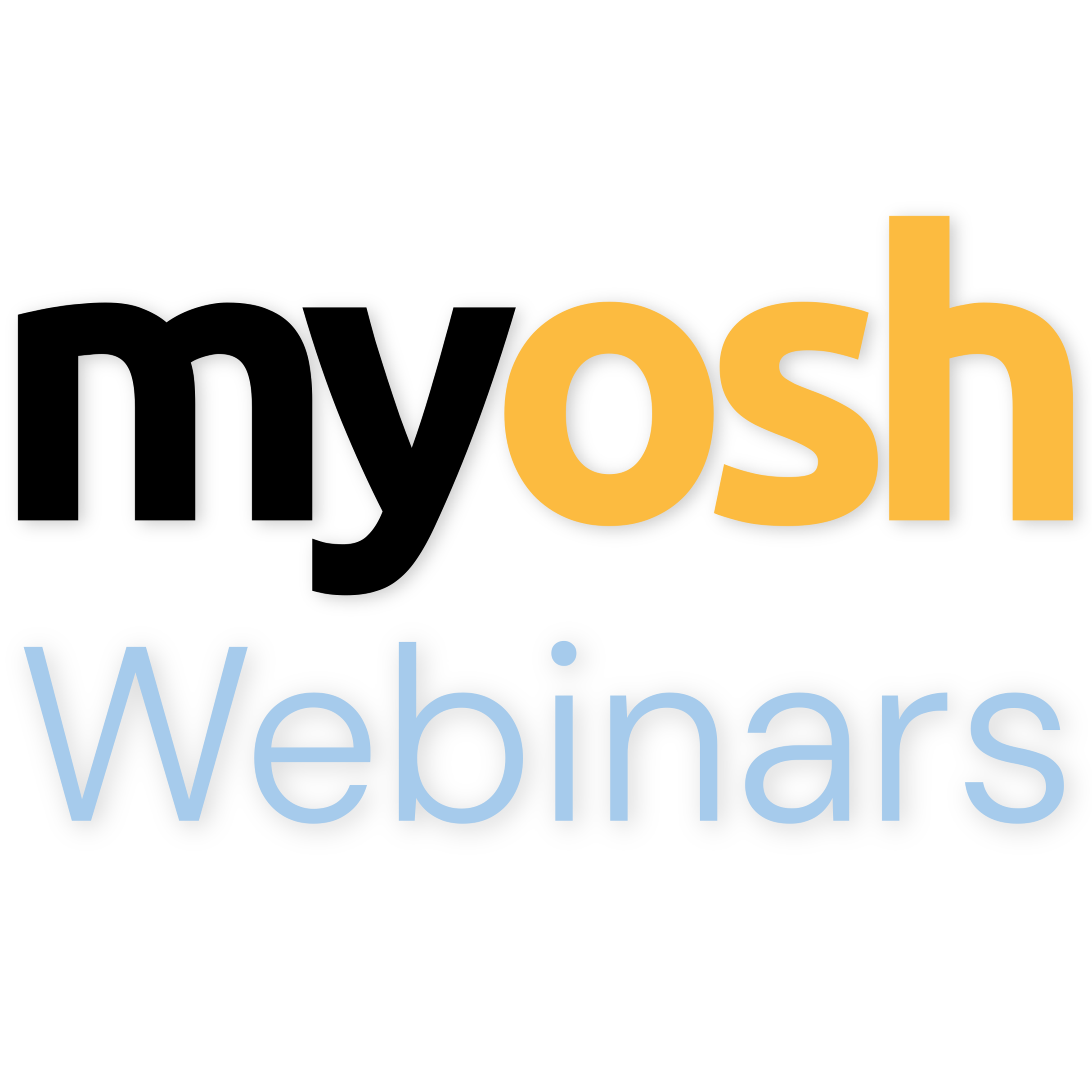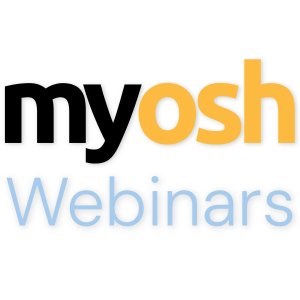
10.5K
Downloads
252
Episodes
myosh hosts regular HSEQ Industry Webinars. These podcasts include all of our webinars presented by leading industry experts and include topics such as Safety Differently, Mental Health, HSEQ Law, Leadership, Learning Teams, HOP (Human Organisational Performance), Chain of Responsibility, Safety Culture, Climate and much more.
myosh hosts regular HSEQ Industry Webinars. These podcasts include all of our webinars presented by leading industry experts and include topics such as Safety Differently, Mental Health, HSEQ Law, Leadership, Learning Teams, HOP (Human Organisational Performance), Chain of Responsibility, Safety Culture, Climate and much more.
Episodes

Thursday Aug 24, 2023
Safety vs Wellbeing Programs – How to Boost Employee Engagement
Thursday Aug 24, 2023
Thursday Aug 24, 2023
What’s covered?
According to Maslow, there are four fundamental foundations that we must achieve before realising our potential: physiological needs, safety needs, love and belonging, and esteem. Often organisations skip straight to ‘safety’ to address employee wellbeing, however physiological needs form the basis of our health. Sleep, mindset, nutrition, and movement must be considered.
In this webinar, the Director of Better Being, Greg Stark, will explore these foundations and help you identify best practice for your business.
- Understanding how Maslow’s hierarchy of needs fits into the employee experience
- Steps to determine what wellbeing programs to implement
- Strategies to support the physiological wellbeing of employees

Monday Jul 17, 2023
Monday Jul 17, 2023
The modern workplace has changed dramatically in recent years with an increased emphasis on the psychological well-being of employees. With recent changes in legislation and upcoming regulatory compliance obligations, companies can no longer ignore the importance of psychosocial risk management and its impact on productivity, morale, employee retention and physical safety.
Join Ben Carnell, Head of Client Solutions at Sentis as he explores strategies for organisations to simplify the process of psychosocial risk management, ensuring a safer, healthier and more productive workplace.
In this webinar, gain a deeper understanding of:
- the unseen hazards and invisible injuries that can impact your employees’ well-being
- the impact of psychosocial risk on physical safety
- how to empower your leaders to promote well-being and reduce psychosocial risks
- best practice approaches to integrating psychosocial risk assessment into your current safety framework
- proactive strategies to manage psychosocial safety and stay ahead of the curve

Thursday Jul 06, 2023
A case for operational learning
Thursday Jul 06, 2023
Thursday Jul 06, 2023
Presented By Becky Picton, Human Factors and HOP Facilitator, Southpac
What’s covered?
Operational Learning is a Human and Organisational Performance (HOP) based technique of learning from those closest to the work to gain operational intelligence.
During this session we will introduce operational learning, what it is, what it isn’t and how it can be used across industry as a proactive means to learn and improve before negative events occur, improving both work and safety performance.

Friday May 19, 2023
The Power of Deep Listening
Friday May 19, 2023
Friday May 19, 2023
What difference would it make if Safety leaders and professionals changed the way they
listened?
Did you know that …..
- Most of us have an 8 second attention span (BTW our attention span is 1% lower
than a gold fish!) - 85% of what we learn is from listening
- 75% of the time we are distracted or pre-occupied
- One hour after listening we recall 20% of what we heard
- The average person listens at 25% efficiency
(Source: Tara Brach podcast episode 31 March 2023)
Listening is such an underrated skill. When we are at school we are taught to read and write but not actually how to listen.
In this interactive session you will experience what it is like to truly be listened to and the impact it has on you. Listening as a Safety Leader and Professional is one of the most critical and crucial skills you can demonstrate if you are to do your job well. People will more likely trust you and open up and be vulnerable around what is really happening – particularly around safety.
Come along to this session to practice deep listening and to hear some simple tips on how you can be even better listener to improve your effectiveness in your role and the
relationships you have inside and outside of work.

Thursday May 04, 2023
Our top 5 tips for risk assessments
Thursday May 04, 2023
Thursday May 04, 2023
Presented by Mark Alston
What’s covered?
Organisations often struggle to achieve meaningful outcomes from risk assessment workshops. In this webinar, Mark Alston shares five practical tips for improving risk assessment workshop outcomes and delivering controls that reduce risk.
- Change the focus of risk assessments: Rather than simply justifying a decision that has already been made, use risk assessments to identify uncertainty and unknowns.
- Include the discovery of normal work: In addition to identifying potential risks, it’s important to understand the context of work and the risks that come with it.
- Develop risk scenarios that focus on the credible.
- Push the boundaries of controls.
- Ditch the Excel spreadsheets and other risk assessment tools.

Thursday Apr 20, 2023
Psychosocial Dx: Identifying Invisible 45003 Factors
Thursday Apr 20, 2023
Thursday Apr 20, 2023
Presented By Penny Pearce and Mark Wright, FEFO Consulting
FEFO Consulting has designed a Psychosocial Dx to measure performance, apply reliable benchmarks and Levers for action.
Can surveys be used to assess risk or only identify hazard?
What options are available to manage psychosocial factors that are simple pragmatic and value add?
Join us during this webinar to understand Psychosocial Diagnostic (Dx) options and methods of responding to range of psychosocial regulations and industry guidance:
- Options available to identify hazards and assess risks that are often invisible
- Understand specific areas of exposure, job demands, job resources and the impact these have on work outcomes.
- Utilise reliable Levers to prevent, respond and promote healthy workplaces and high performance.
- Case studies of transferring legal requirements and theory into practices that add value.

Friday Mar 31, 2023
Measurement that enables safety capacity
Friday Mar 31, 2023
Friday Mar 31, 2023
Presented by Kelvin Genn, CEO, Art of Work
What’s covered?
Safety is a function of work capacity, not the absence of the measurement of absence or counting of transactions. New measurement tools have been developed to provide a metric for Boards and Executives of organisations to understand the presence of safety capacity in their organisation by collecting and reporting on the state of operational capacity through enabling those that do the work.
These measures examine the extent of capacity building activities being undertaken in terms of reflecting on the investment the organisation has built up in the skills and capability of workers over and above the minimum competencies for their work. Capacity measures provide an index on the extent of resourcing for enablers of safety. Capacity measures are the high-water mark of the legislative obligations placed on officers to meet due diligence obligations that derive from workplace health and safety laws in jurisdictions such as Australia and New Zealand.
Safety Capacity is informed by an approach to health and safety that looks to build the health and safety capacity and resilience of an organisation, founded on engagement and trust with workers.

Thursday Mar 30, 2023
Positive Safety - Shifting the focus from compliance to culture
Thursday Mar 30, 2023
Thursday Mar 30, 2023
Presented by Anthony Gibbs, CEO, Sentis
What’s covered?
What does safety look like in your organisation? Is safety looked at as a cost or as an opportunity? Are employees seen as the problem or the solution?
It’s easy to fall prey to the idea that safety takes too long, costs too much or just gets in the way of getting the job done. But what if we looked at safety as a form of currency that we can use to invest in the things that matter most?
Join Sentis CEO Anthony Gibbs as we flip the traditional safety narrative on its head and create a space where people share a values driven desire to do great work in which quality and safety are paramount, and people are intrinsically motivated to invest in the safety and wellbeing of themselves and others.
Throughout this webinar we will discuss:
- the definition of Positive Safety,
- using safety as an anchor for cultural change
- what a positive safety culture looks like, and
- how you can start implementing a Positive Safety culture in your organisation

Thursday Mar 23, 2023
Verification of Competency (VoC)
Thursday Mar 23, 2023
Thursday Mar 23, 2023
On average, plant & equipment account for 71% of mechanisms related to worker fatalities². A Verification of Competency or VOC is a method of assessment which typically ensures that workers operating plant, equipment and other tools on work sites remain competent to do so – to keep themselves, others safe and solvent.
This webinar provides a risk-based approach to establish a VOC program that not only meets legal requirements, but also enables effective risk controls and a high-performance culture.
Learning Objectives
- Understand your legal obligations for VoC, including operator competency vs assessor competency
- Understand how to demonstrate due diligence and minimise risk of personal liability – facts vs myths!
- List options for taking a risk-based approach for establishing VoC safe systems of work
- Gain an understanding of leadership principles and methods of building a high-performance culture.

Thursday Mar 09, 2023
Artificial intelligence vision and its use in health and safety
Thursday Mar 09, 2023
Thursday Mar 09, 2023
Join Kieran MacKenzie, founder of Presien, a Sydney-based AI company spun off from Laing O’Rourke, to learn about new artificial intelligence vision systems and how they will revolutionize heavy industry safety and productivity.
